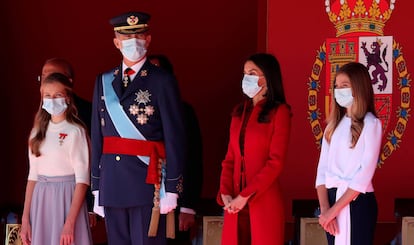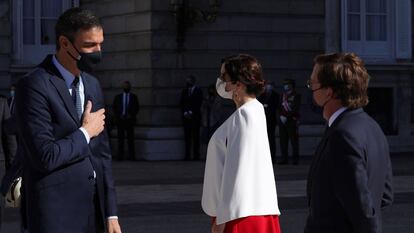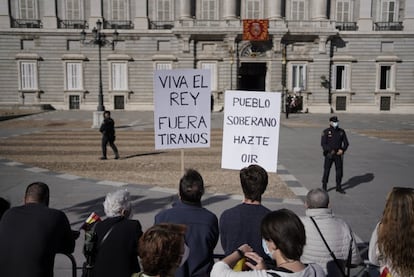Spain’s National Day celebrations marked by political tension and protests
The event paid tribute to the frontline workers of the coronavirus crisis as the central and Madrid governments continue to clash over how to contain the virus

The Spanish royal family presided on Monday over celebrations to mark Spain’s National Day on October 12 amid protests against the central government. The event, which was scaled down due to the coronavirus pandemic, paid tribute to the civil organizations that have been on the frontline of the fight against the virus.
The traditional military parade down the Paseo de la Castellana avenue was canceled due to the coronavirus pandemic and replaced by a closed-door event in the Armería square of the Royal Palace in Madrid. This act, presided over by the royal family, included the raising of the flag, a tribute to the fallen, an award ceremony and a military parade. A total of 527 soldiers took part in the parade, with members representing all units deployed in Madrid – the only exception being the Spanish Legion which was given special prominence as this year marks its 100th anniversary.

But the act – held under the slogan “The Effort that Unites Us” – was marked by heightened political tensions between the central government, headed by a center-left coalition of the Socialist Party (PSOE) and junior partner Unidas Podemos, and the Madrid administration, run by a center-right alliance of the Popular Party (PP) and Ciudadanos (Citizens), propped up by the far-right Vox. For weeks, the two governments have been at odds over how to control the spread of the coronavirus in the region, which has once again become the epicenter of the coronavirus pandemic in Spain.
Spanish Prime Minister Pedro Sánchez, of the PSOE, spoke briefly with Madrid premier Isabel Díaz Ayuso, of the PP, at 12pm before the start of the event. This was the first time the two leaders had met since the Spanish government declared a state of alarm in the Madrid region last Friday. The move allowed the government to introduce a perimetral lockdown in nine Madrid cities with high infection rates, but was fiercely opposed by the Ayuso administration, which has accused the government of interference.
At the National Day event, hundreds of people gathered outside the palace to applaud Spain’s King Felipe VI and to boo the coalition government. Vox also called on protesters to drive around the streets of Madrid at 12pm in demonstration against the “criminal and totalitarian government.”
Parliament sources said that the lower house will debate a no-confidence motion filed by Vox against the government on October 21 and 22. The move has no possibility of success, as Vox has 52 lawmakers in the 350-seat Congress of Deputies and has not attracted support from any other parties, not even those on the political right.

The leaders of all Spain’s regions, with the exception of the Basque Country, Catalonia, Aragón, Murcia and the Balearic Islands, were present at the act, as well as local authorities and military officials. Representatives of frontline workers, such as Madrid’s specialized emergency service (SAMUR), the firefighter brigade, civil protection agency and National Police, also attended the event. This year, however, there was no formal reception at the Royal Palace.
This was the first National Day event to be presided by the coalition government, which has been showing signs of division in recent weeks, particularly in response to the executive’s relationship with the head of state. Unidas Podemos openly supports a Spanish republic and one of its members, Consumer Affairs Minister Alberto Garzón, has accused King Felipe VI of “maneuvering” against the government. Despite this, Podemos leader Pablo Iglesias, who is also one of Spain’s four deputy prime ministers, greeted the king with “institutional normality,” according to sources close to him.
At 10am, Defense Minister Margarita Robles held a videoconference with soldiers deployed abroad to thank them for their work.
English version by Melissa Kitson.
Tu suscripción se está usando en otro dispositivo
¿Quieres añadir otro usuario a tu suscripción?
Si continúas leyendo en este dispositivo, no se podrá leer en el otro.
FlechaTu suscripción se está usando en otro dispositivo y solo puedes acceder a EL PAÍS desde un dispositivo a la vez.
Si quieres compartir tu cuenta, cambia tu suscripción a la modalidad Premium, así podrás añadir otro usuario. Cada uno accederá con su propia cuenta de email, lo que os permitirá personalizar vuestra experiencia en EL PAÍS.
¿Tienes una suscripción de empresa? Accede aquí para contratar más cuentas.
En el caso de no saber quién está usando tu cuenta, te recomendamos cambiar tu contraseña aquí.
Si decides continuar compartiendo tu cuenta, este mensaje se mostrará en tu dispositivo y en el de la otra persona que está usando tu cuenta de forma indefinida, afectando a tu experiencia de lectura. Puedes consultar aquí los términos y condiciones de la suscripción digital.








































